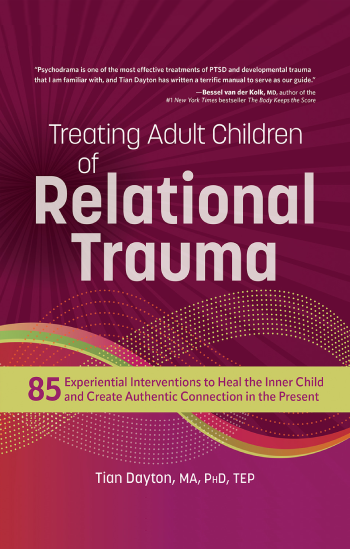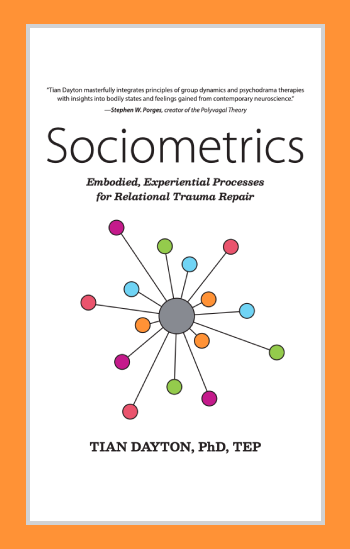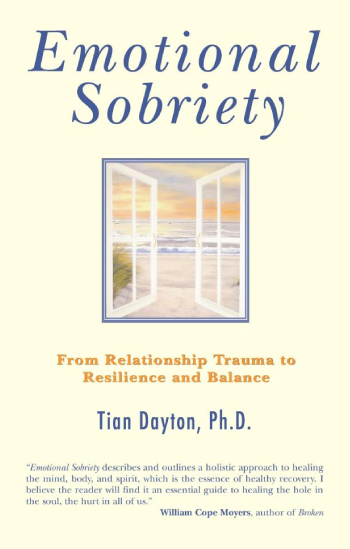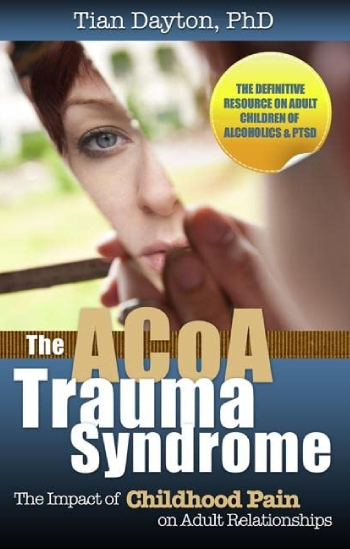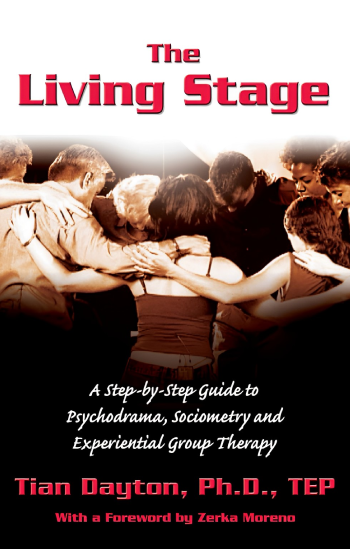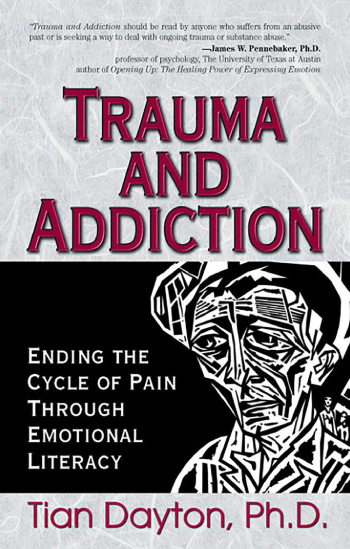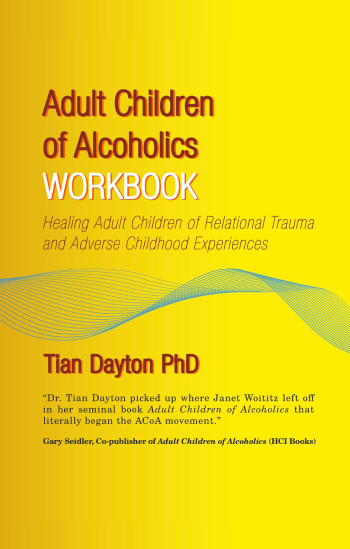Endorsements
Treating Adult Children of Relational Trauma
“Psychodrama is one of the most effective treatments of PTSD and developmental trauma that I am familiar with, and Tian Dayton has written a terrific manual to serve as our guide. Psychodrama helps to make our inner world visible and manifest what we struggle with, not so much by words, but by actions, making the invisible observable and measurable. Operating in a space where important people from our past are recreated in the living present, and where we can experience and manifest our confused inner world, we can finally say the words that were never spoken, and allow feelings to emerge that could not be expressed back then. Working with others in three-dimensional space, as psychodrama does, can not only uniquely create a timeless experience where past and present can merge to help us reconfigure our mental alignment, but also provide profound reparative experiences.”
―Bessel van der Kolk, MD, professor of psychiatry at Boston University School of Medicine, president of the Trauma Research Foundation, and author of the #1 New York Times bestseller The Body Keeps the Score
“We store the imprint of trauma in our bodies as ‘snapshots’ frozen in the nervous system that tell the story of how the body-mind experienced trauma. Therapists need to understand what the living, sensing body is telling us in order to help clients heal. Tian Dayton’s approach to embodied therapy using psychodrama informed by Somatic Experiencing® allows the body’s unspoken voice to come forward and be heard. In this treatment guide, Tian has provided us with an unparalleled approach for treating relational trauma that confirms what we know to be true: Bringing the body into healing is a crucial component of recovery. I highly recommend this book to anyone who is treating the pain of unhealed attachment wounds.”
―Peter Levine, PhD, developer of Somatic Experiencing® and best-selling author of Waking the Tiger
Sociometrics Embodied, Experiential Processes for Relational Trauma Repair
“In Sociometrics, Tian Dayton masterfully integrates principles of group dynamics and psychodrama therapies with insights into bodily states and feelings gained from contemporary neuroscience. Sociometrics infuses therapeutic principles in an intuitive and functional program that shifts the agent of healing from the therapist to the group. We learn that through sociometrics, the threads of healing are woven as the client experiences a reconnection with the inner self and a connection with others.”
—Stephen W. Porges, PhD, Distinguished University Scientist,Indiana University; Professor of Psychiatry, University of North Carolina; creator of the Polyvagal Theory
“With her decades of experience, taught by the masters, Tian Dayton has become one herself. In Sociometics, she offers the clinical field another enriching, engaging book that clearly details how to work with the ramifications of trauma and addiction. Her detailed theoretical and practical descriptions of the use of sociometrics and psychodrama empower clinicians in all settings to create a space of safety and choice for the client. I have witnessed her work and seen the movement for those caught in the flight, fight, or freeze mode. Work that sometimes never gets resolved, or takes years, is readily hastened in these action methods.”
—Claudia Black, PhD, Senior Fellow at The Meadows and author Unspoken Legacy: Addressing the Impact of Trauma and Addiction within the Family
Emotional Sobriety: From Relationship Trauma to Resilience and Balance
“A holistic approach to healing the mind, body, and spirit–which is the essence of healthy recovery. . . . An essential guide to healing the hole in the soul, the hurt in all of us.”
—William Cope Moyers, Author of Broken
“Every morning I start my day with Tian Dayton,. She is the muse to everything that is good in our universe. Reading Tian personally helped me find my smile again.”
—Joey Pantoliano, actor in the Sopranos, The Fugitive, New York Times best-selling author of Asylum; Hollywood Tales of My Great
“In emotional sobriety, Dr. Tian Dayton, explains in helpful detail, how our hearts, minds, and spirits are wounded, and what is needed to recover. She describes neuroscience in layman’s terms, so clinicians, recovering people, and families are able to understand how and why our inner selves struggle to find a balance and peace. Her understanding of the connections between mind, body, hard, and spirit are what have been needed in the recovery field. We now have scientific evidence as to why recovery works. Today, neuroscience is proving that the mind, body treatment approaches we have been taking for the last three decades are indeed, evidence based.”
—Sharon Wegscheider-Cruz, and author of Another Chance and founder Onsite Workshops.
The ACoA Trauma Syndrome, The Impact of Childhood Pain on Adult Relationships
“For people with addiction or mental illness in their family of origin, this book is an excellent place to start. It integrates scientific research with practical recovery knowledge, offering the reader a complete picture.”
—Patrick Carnes, PhD, author of the national best seller Out of the Shadows
“Tian Dayton lays out and insightful, compassionate and expansive view of the lifelong effects of growing up in addicted families. This book is laced with references to science, but more importantly, to her own personal experience, and the experiences of her clients who are on the journey of recovery, healing, and breaking the inter-generational cycles of addiction.”
—Robert Anda MD and through the CDC the originator of The Adverse Childhood Experiences Study along with Vincent Feletti of Kaiser Permante
“Tian Dayton’s new book should be required reading for policy and program makers at all levels of government and reading. It will not be a chore. With clarity and insight her beautiful writing captures both the chronic pain of growing up in a highly stressed, dysfunctional family, and the later effects such experiences can have on children, whose submerged feelings may resurface and affect their parenting and interpersonal relationships for generations. These are not headline catching stories of families, torn apart by hurricanes or wars, but the far more pervasive and equally wrenching dramas that play out in the living rooms of families impacted by addiction and dysfunction. Dayton’s important book offers a rare window into the reality of family life for millions of Americans, affected by the programs or lack of programs intended to address these issues. We incur a high cost in dollars and public health by failing to take a comprehensive approach to the healing of such families.”
—Alan Levitt, former associate Director of the White House drug policy office and Director of the national youth anti-drug media campaign
The Living Stage: A Step-by-Step Guide to Psychodrama, Sociometry and Experiential Group Therapy
“Moreno never intended for his approach to the field of human interaction to be limited to the clinical setting. It has taken him a lifetime to be accepted, and although he is becoming more recognized as a seminal thinker, and his influence at-large is growing, there are still vast areas of need. The sociologists would say that he “has been absorbed by the culture” but that is only superficially true. Tian Dayton, is helping to correct that and to bring his work to deeper and broader layers of our culture with this penetrating and far-reaching book.”
From the forward by Zerka. T Moreno wife of JL Moreno.And co-developer of the field of psychodrama and sociometry and group psychotherapy.
Trauma and Addiction: Ending the Cycle of Pain Through Emotional Literacy
“Tian Dayton does a masterful job of weaving, solid scientific findings with her professional and personal experience into a thoughtful analysis of traumatic experience, secrecy and addictive behaviors. Her book should be read by anyone who suffers from an abusive past, or is seeking a way to deal with ongoing trauma, or substance abuse. Dayton is a superb writer, who understands the intricacies of emotional turmoil and the roads to healing.”
—James W Panabaker, PhD, professor of psychology at the University of Texas at Austin author of Opening Up: The Healing Power of Confiding in Others.
“This is a serious well thought through and thoroughly documented book. Tian Dayton, is a clinician with a broad view and the book reflects this great sweep in which she is able to place a number of approaches in the context of healing.”
—Zerka. T Moreno and co-developer of the field of psychodrama and sociometry and wife of J L Moreno
“With great skill, insight and compassion, Tian Dayton’s new book builds a much-needed bridge, connecting addictions to trauma theory. It is a major contribution to addiction’s, mental health and psychodrama literature. All helping professionals, especially psychotherapist and addiction’s counselors, will find new ways of thinking and practical approaches valuable to their work.”
—Jane Middleton, author of Children of Trauma and After the Tears.
Adult Children of Alcoholics and Relational Trauma:WORKBOOK
Dr. Tian Dayton picked up where Janet Woititz left off in her seminal book Adult Children of Alcoholics that literally began the ACoA movement.
In Dayton’s book The ACoA Trauma Syndrome, Dr. Dayton provided a clear understanding of the body of research on trauma that has become so significant since the ACoA movement began. And she made the connection for the reader between the ACoA syndrome and post-traumatic stress disorder (PTSD) often experienced by children who grew up in addicted families long after they have left their families of origin. She answered their haunting question: “Why am I feeling the pain from my childhood now, as an adult, when I am no longer even living at home?” After the success of that book, she has now followed it up with this important and fascinating workbook that is much more than a book, it actually helps you heal.
The ACoA (Adult Children of Alcoholics) movement of the 1980s made an enormous contribution to our understanding of addiction as a disease that affects the whole family. Tian Dayton wrote The ACoA Trauma Syndrome in 2012 furthering that body of knowledge and deepening our understanding of the family of origin that surrounds addiction, making its treatment relevant once again.
The Backstory Of Janet Woititz’s Book
We are in the midst of another movement whose time has come, one that has been brought into a new level of intelligence and understanding through the research on neuroscience, attachment, and Adverse Childhood Experiences that has opened the floodgates for millions who experienced the kind of relational trauma in childhood, that’s impacting their physical and/or mental health as adults. More than ever we need to hear the silent scream of the ACOA’s, those who were trapped, through no fault of their own, living within the debilitating effects of the disease of addiction. And their forgotten and silenced inner child, who still shadowboxes with the past, burdening their relationships today with the weight of unresolved pain from yesterday. Tian walks the reader/participant through a process of healing that is life-altering, moving the reader from pain to presence.
Having spent my entire professional life creating platforms for some of the major voices of self-help and recovery, I know just how important, joyful, and life-altering this odyssey is.
